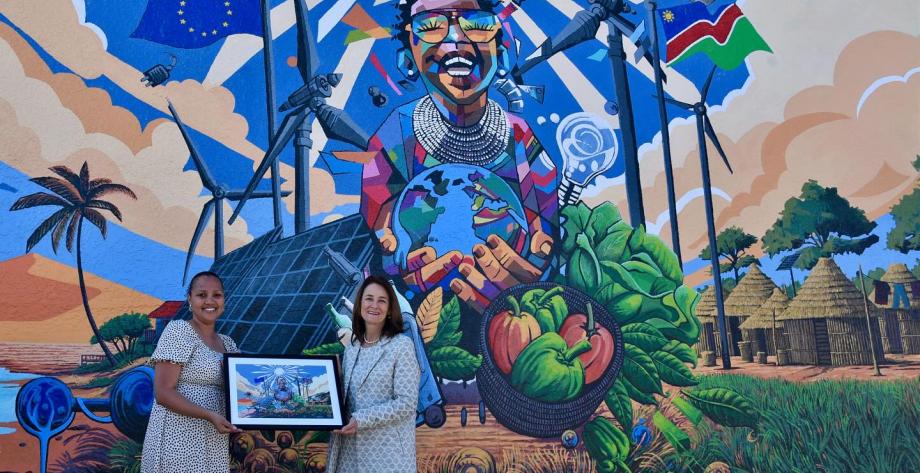EU-Namibia Relations
The European Union and Namibia
Political relations
Namibia is recognised as an important partner for the EU, particularly as a reference for good governance and an as an influential voice within the Southern African region. Namibia‘s governments have consistently worked to reinforce the foundations of the nation, progressively establishing an inclusive, democratic society built on respect for human rights and the rule of law—the guiding principles for the European Union. These shared values are vital for efforts to reduce poverty and address social, economic or political exclusion. Our common focus highlights the importance of EU-Namibia collaboration and lays the foundation for our strong political relationship.
The Partnership between the European Union and Namibia is based on the Samoa agreement. This pact strengthens cooperation between the EU and members of the Organisation of African, Caribbean and Pacific States (OACPS). The Samoa agreement is built on the six principles of human rights and democracy, peace and security, development, migration, climate change and economic growth.
Trade and economic cooperation
As the world’s largest trading bloc, the EU and its 27 Member States operate under a unified trade policy. This simplifies market access, reduces trade barriers and creates opportunities for economies like Namibia to engage with a stable, high-value market.
Namibia benefits from the Southern African Development Community (SADC) Economic Partnership Agreement (EPA)—a free trade agreement with the European Union. The SADC EPA is a development-focused trade agreement, granting asymmetric access to Namibia among five other countries in the region. It can shield sensitive products from full liberalisation and deploy safeguards when imports from the EU are growing too quickly. The agreement also contains a chapter on sustainable development and cooperation.
Thanks to the Economic Partnership Agreement, Namibia has duty-free and quota-free access to the EU market. The EU is also the largest and most diversified trading partner of Namibia, and Namibians enjoy a positive trade surplus with the EU—a key to sustainable growth. This growing partnership strengthens our ties and creates jobs and opportunities that directly benefit the Namibian population. It is truly a partnership that works.
In 2024, Namibia’s trade surplus with the EU was N$ 18 trillion (€874 million). This is a testament to the value of the EU-SADC Economic Partnership Agreement.
Development and cooperation
Most of the EU's direct support to Namibia is channelled through the Neighbourhood, Development and International Cooperation Instrument (NDICI – Global Europe). It is the EU’s main tool to contribute to eradicating poverty and promoting sustainable development, prosperity, peace and stability.
The strategic framework for EU-Namibia cooperation is outlined in the Multi-Annual Indicative Programme (MIP) for 2021-2027. This programme aims to support Namibia's sustainable development and address key challenges, building on a long-standing partnership. It focuses on fostering stability, reducing socio-economic inequalities, and promoting equitable access to quality services for all Namibians.
The MIP is structured around three key priority areas:
| Foundational Skills – Education | Inclusive Green Growth | Good Governance and Gender Equality |
| Early Childhood Development (ECD) and Pre-primary Education (PPE) are the main focal points of this priority area. The EU is funding a budget support programme to improve equitable and inclusive access to quality foundational education, strengthen institutional capacity, and promote community and parental involvement. The initiative also supports school feeding programmes to enhance child nutrition. | With the Inclusive Green Growth priority area, we aim to contribute to a greener, more resilient, and inclusive economic development for Namibia. Our main focus is increasing the share of renewable energies, improving access to clean water and sanitation and enhancing climate change adaptation and biodiversity conservation. This aligns with Namibia's efforts to diversify its economy and build resilience against environmental challenges. | This crucial aspect of the MIP seeks to strengthen Namibia's democratic institutions, promote transparency and accountability, and enhance the fight against corruption. A significant focus is also placed on advancing gender equality, LGBT rights and combating gender-based violence. |
Find more information about specific cooperation projects on our projects page.

The EU has committed N$ 1,3 trillion in grant funding to its 2021–2027 partnership with Namibia, supporting joint priorities across green growth, governance, and human development. In addition, Namibia benefits from a range of multi-country EU programmes, further strengthening regional cooperation and shared progress.


